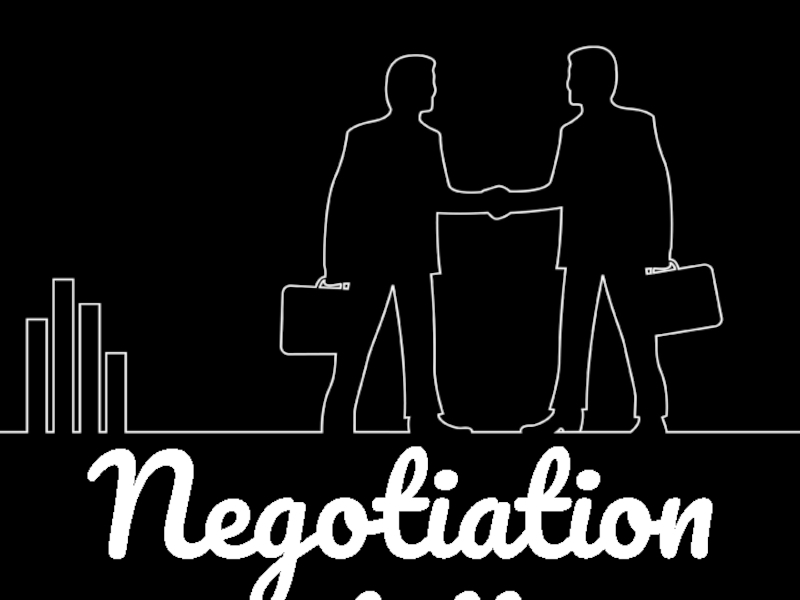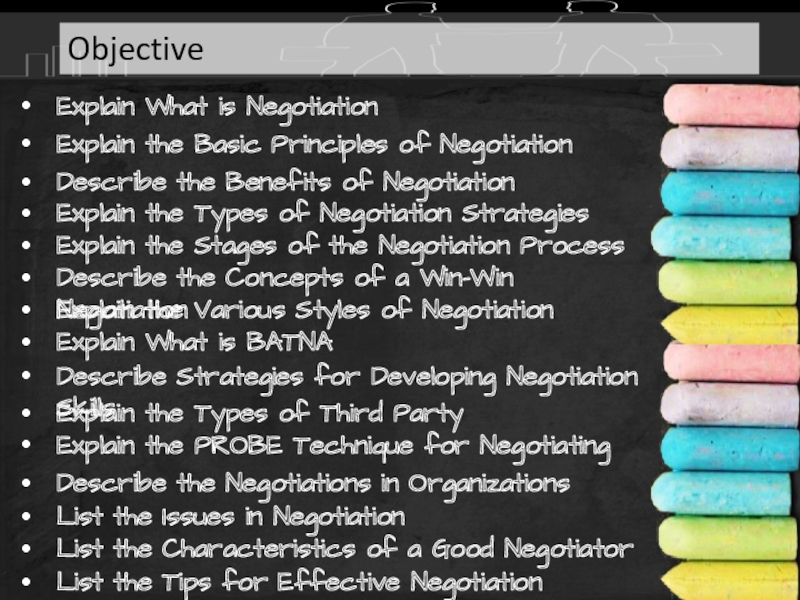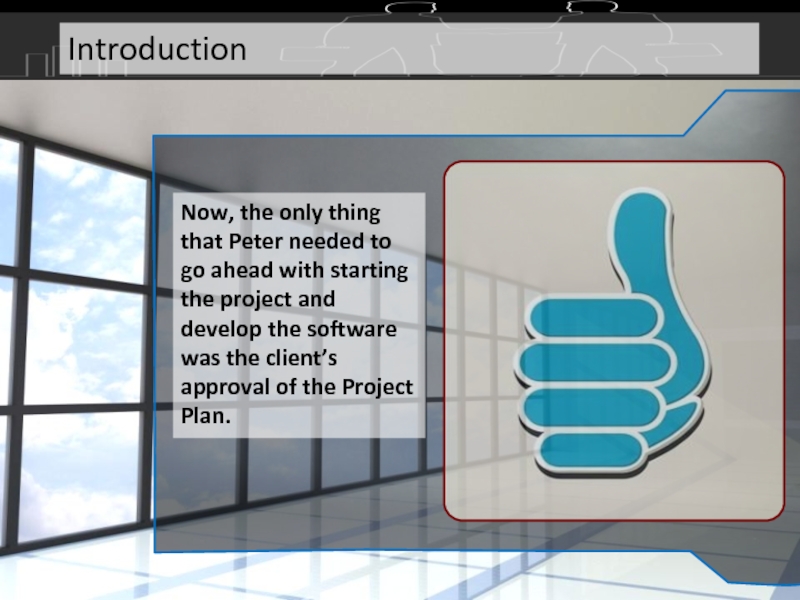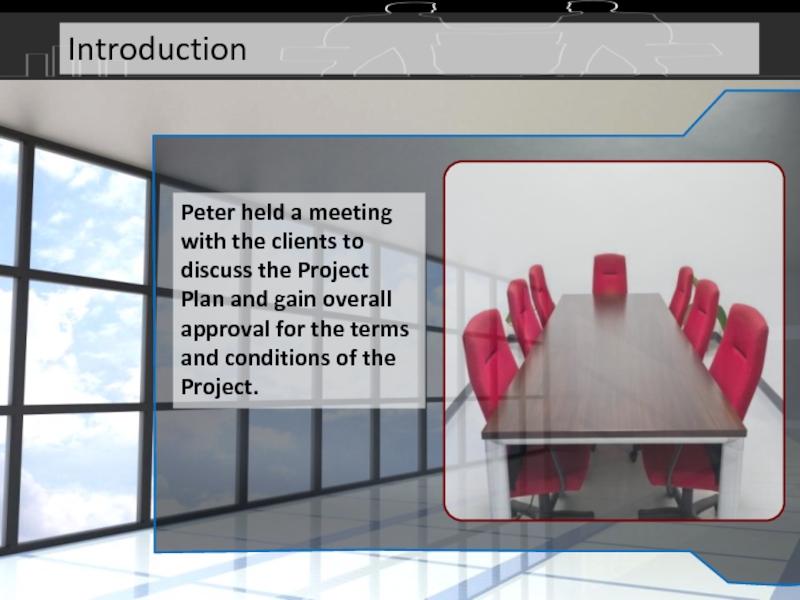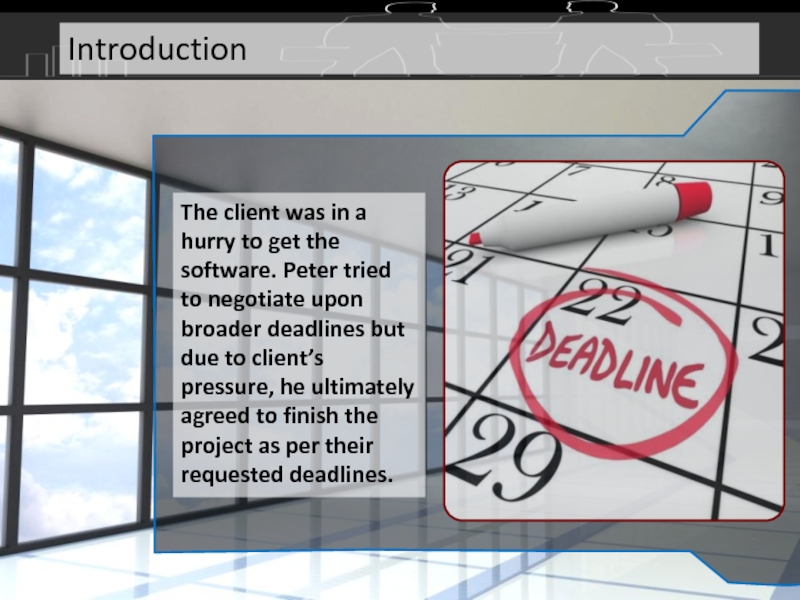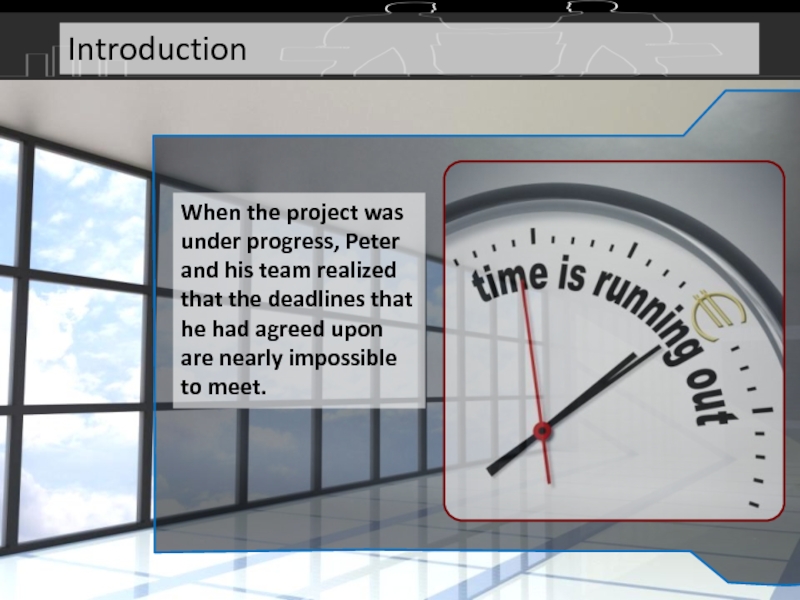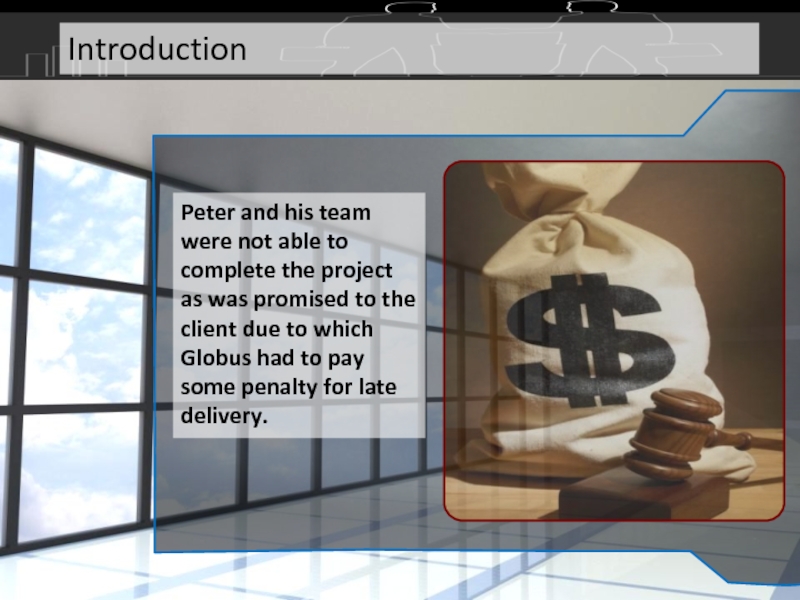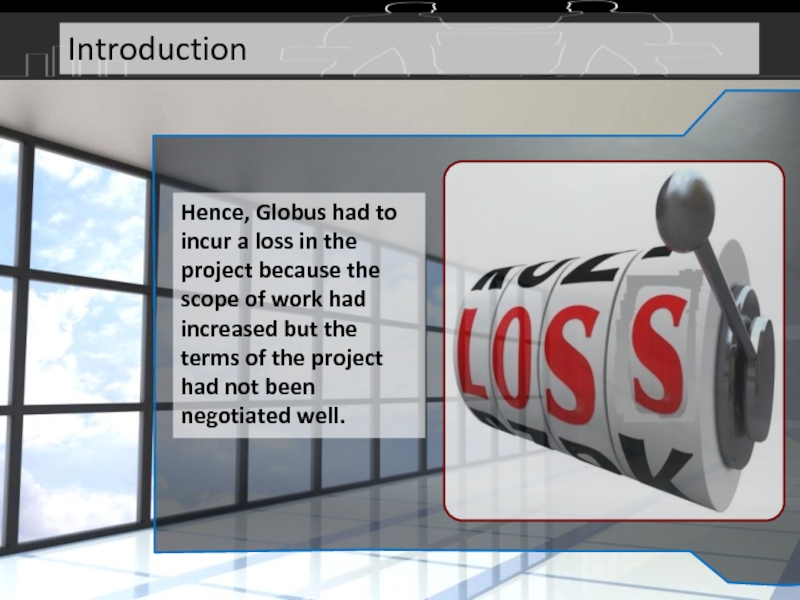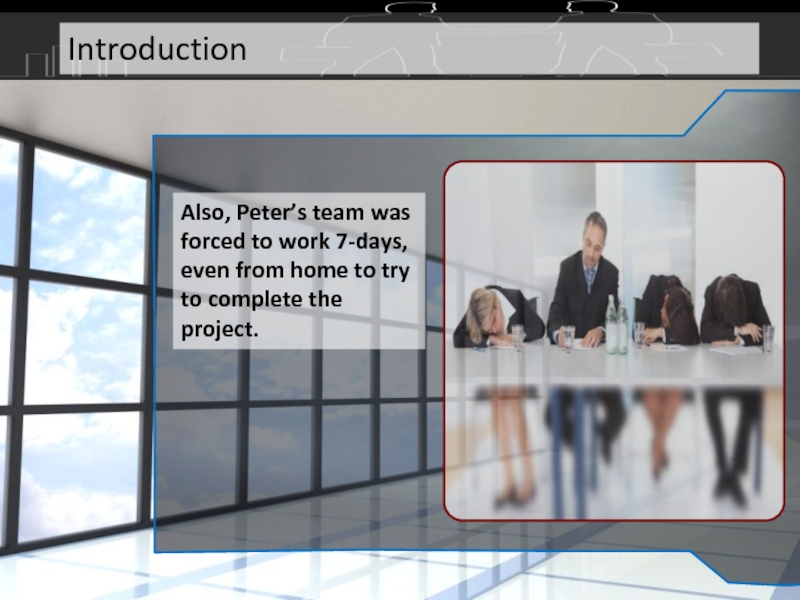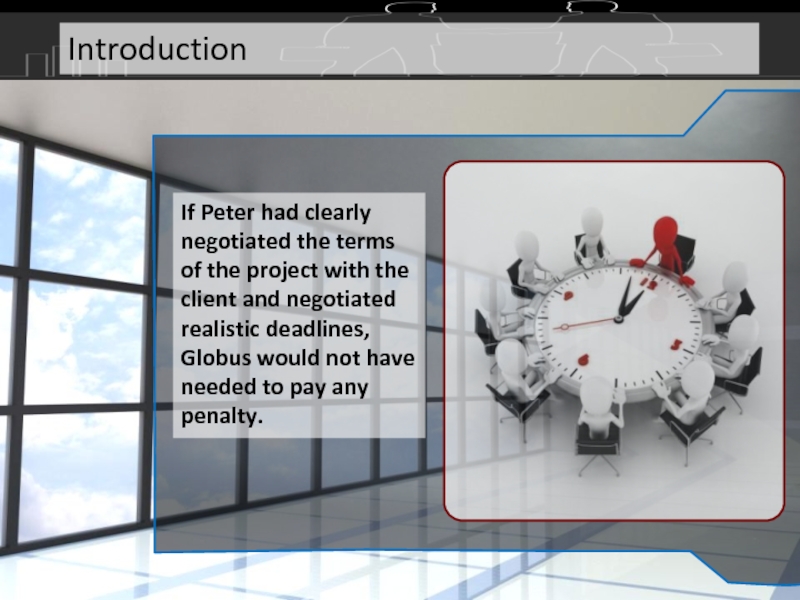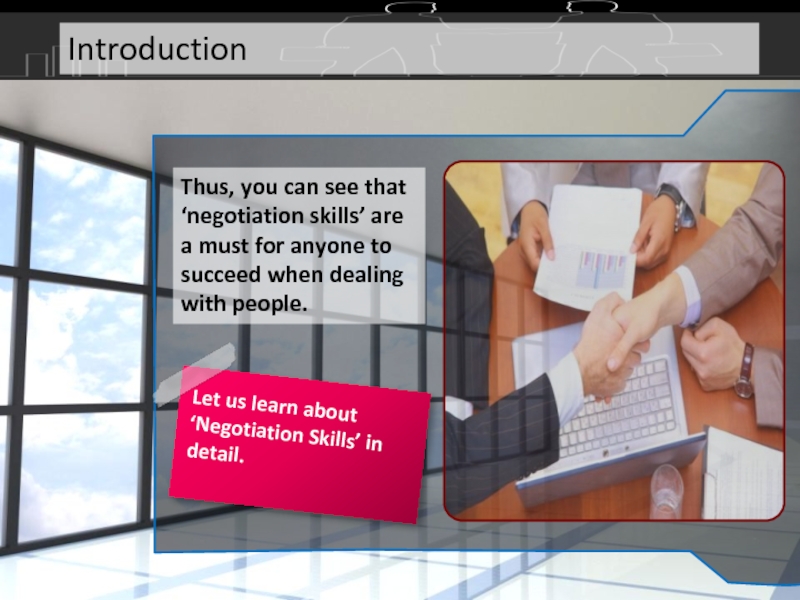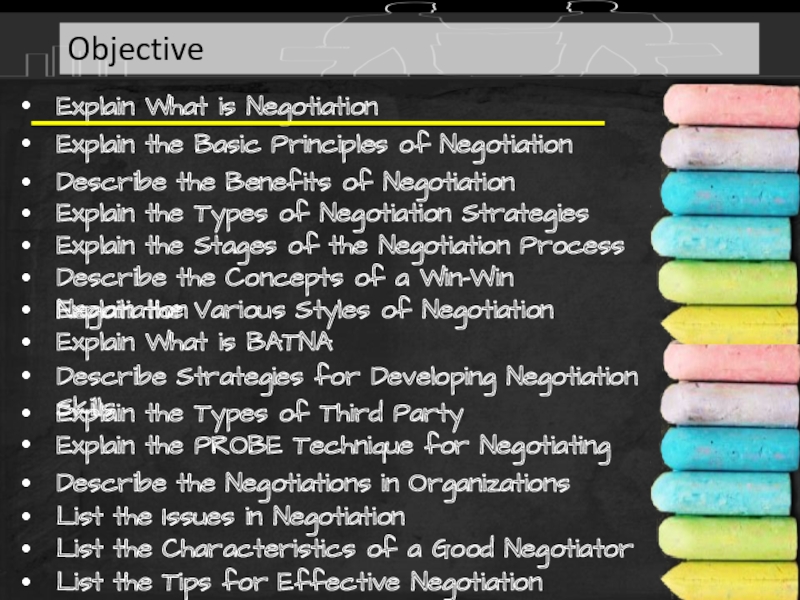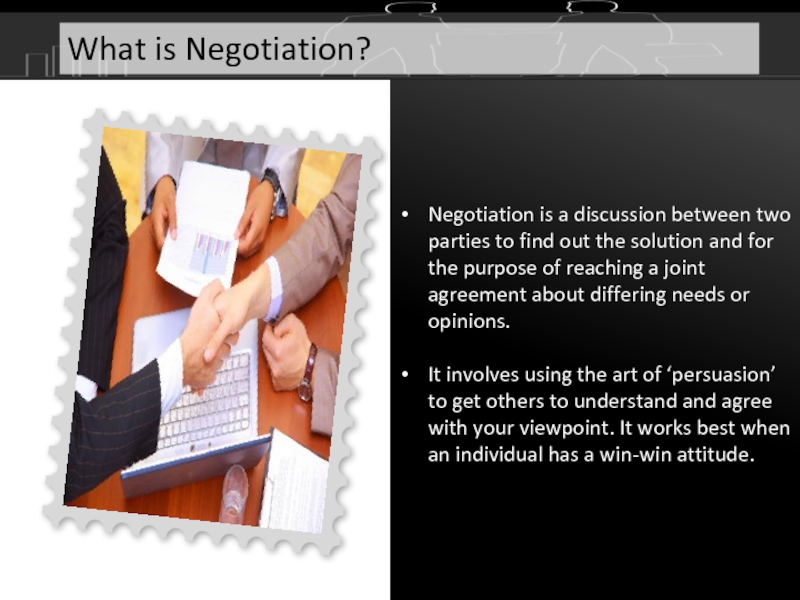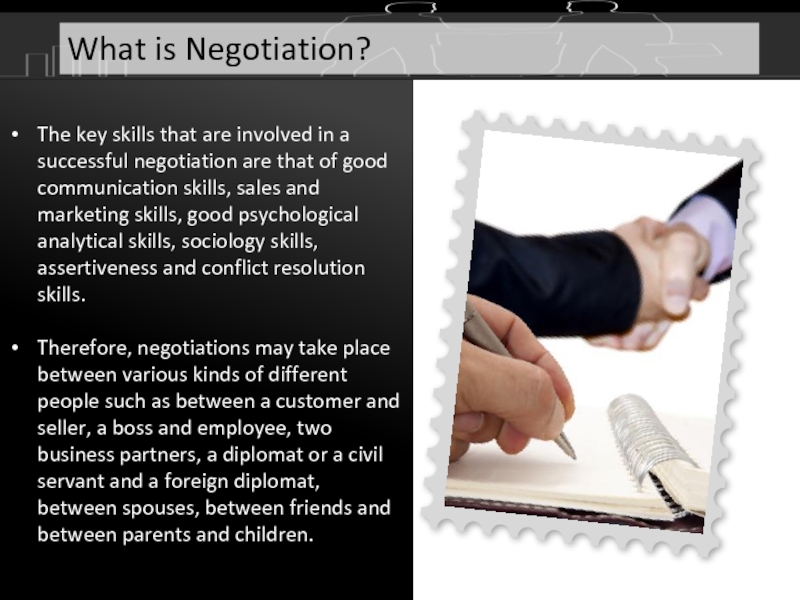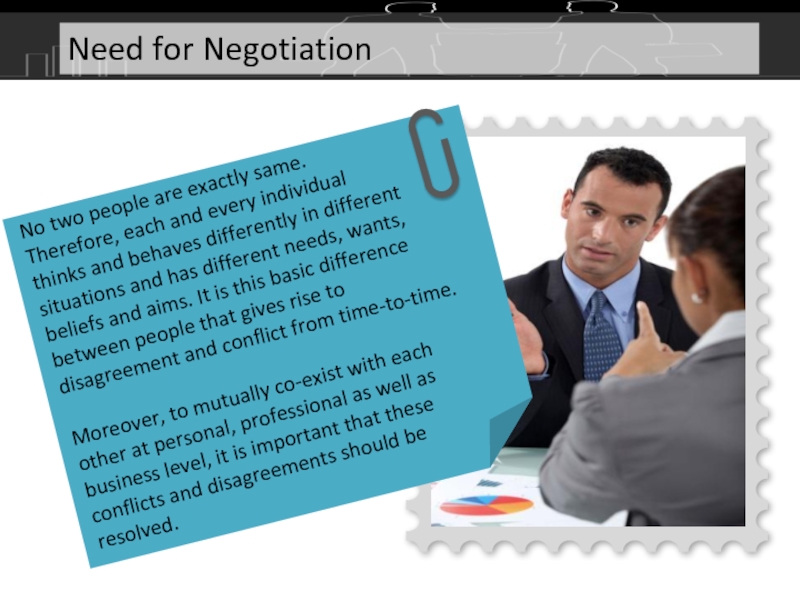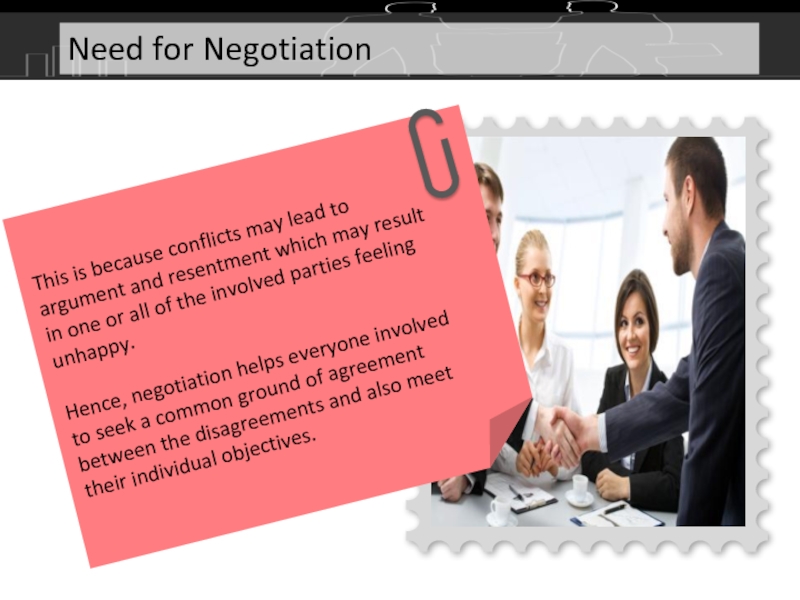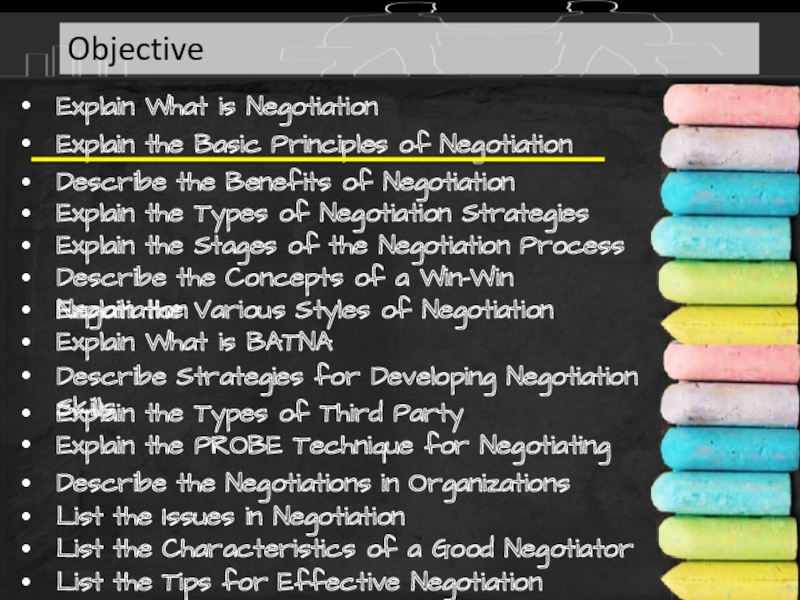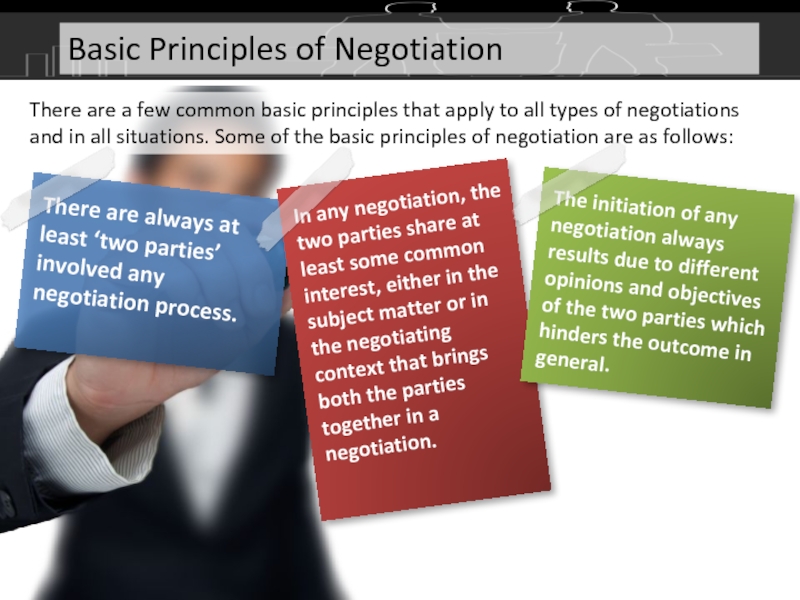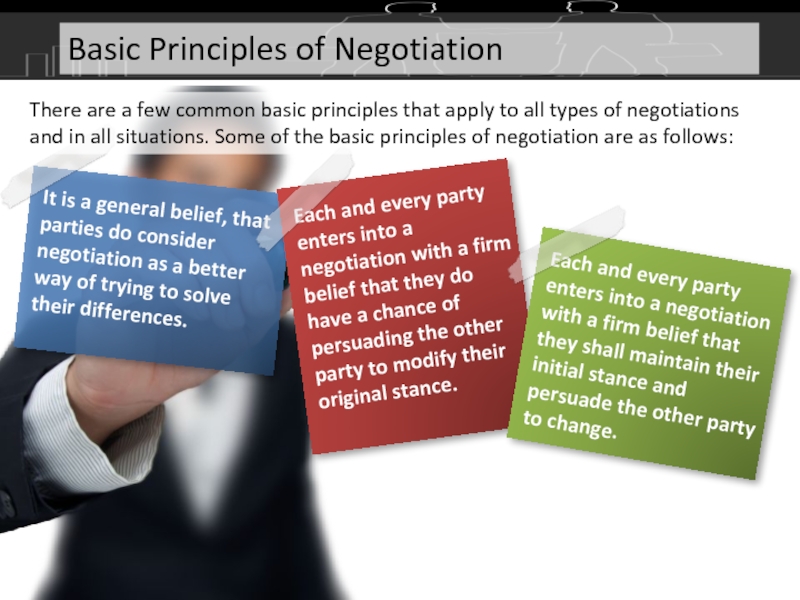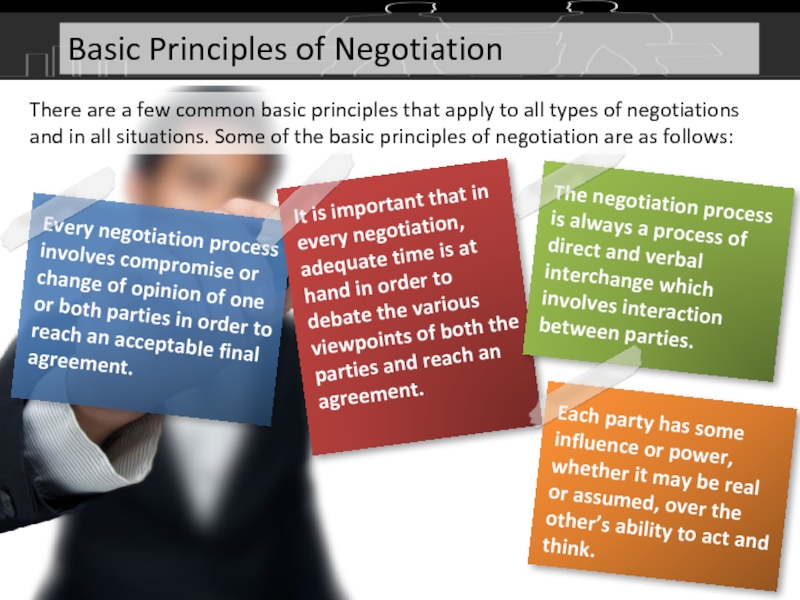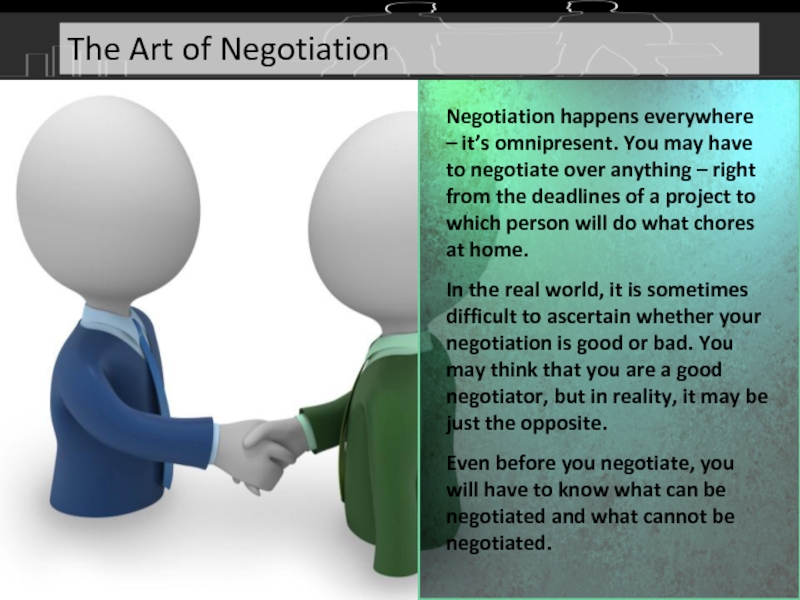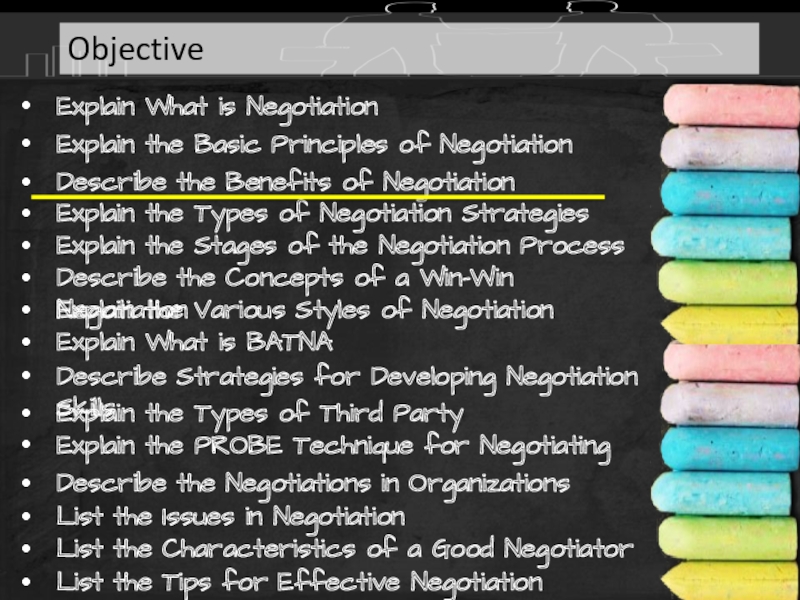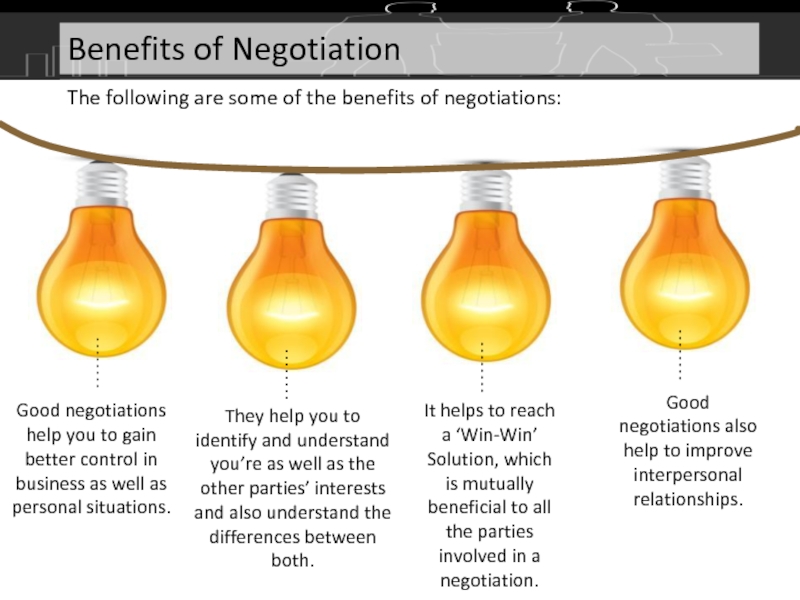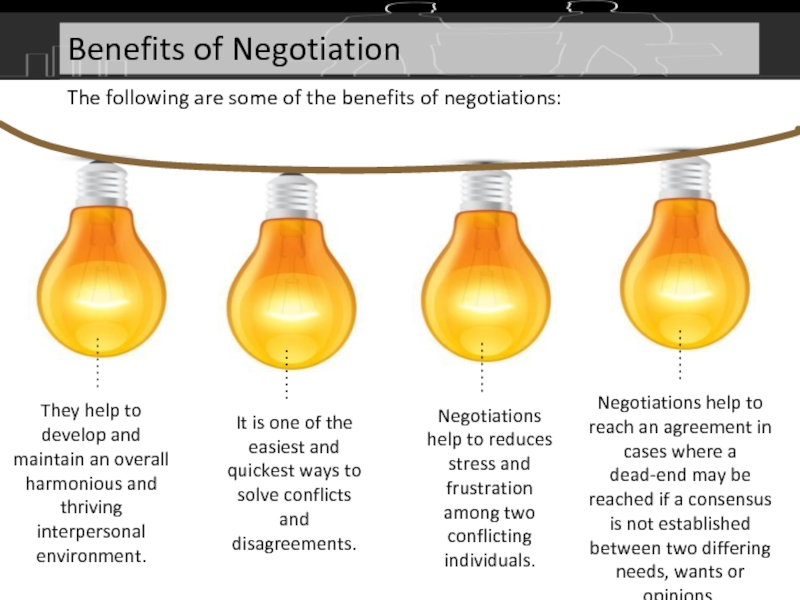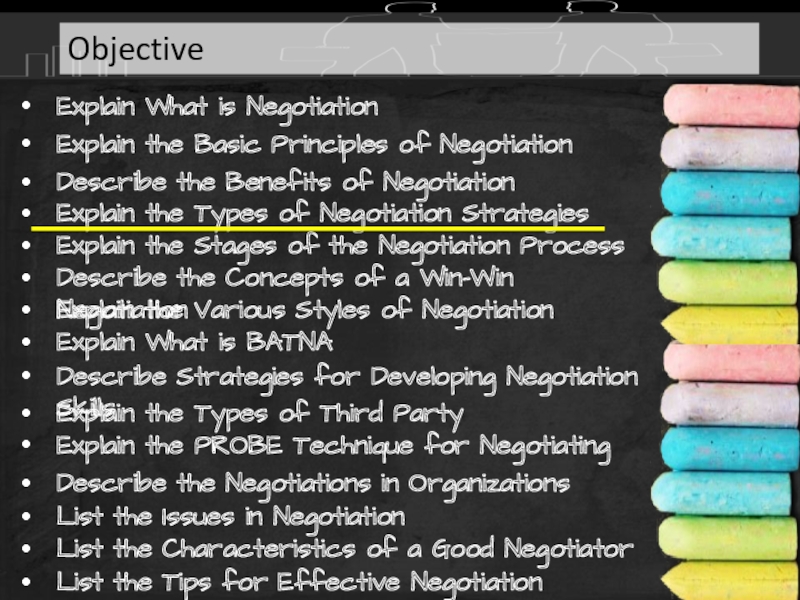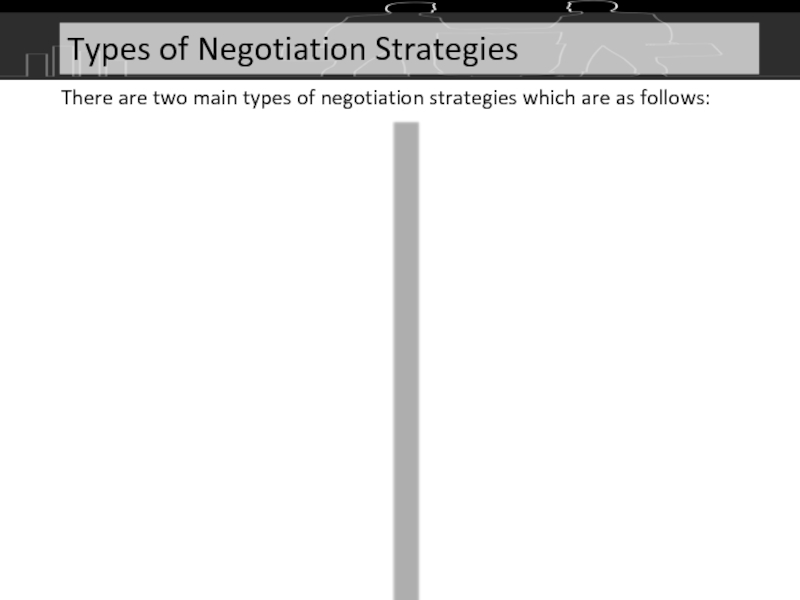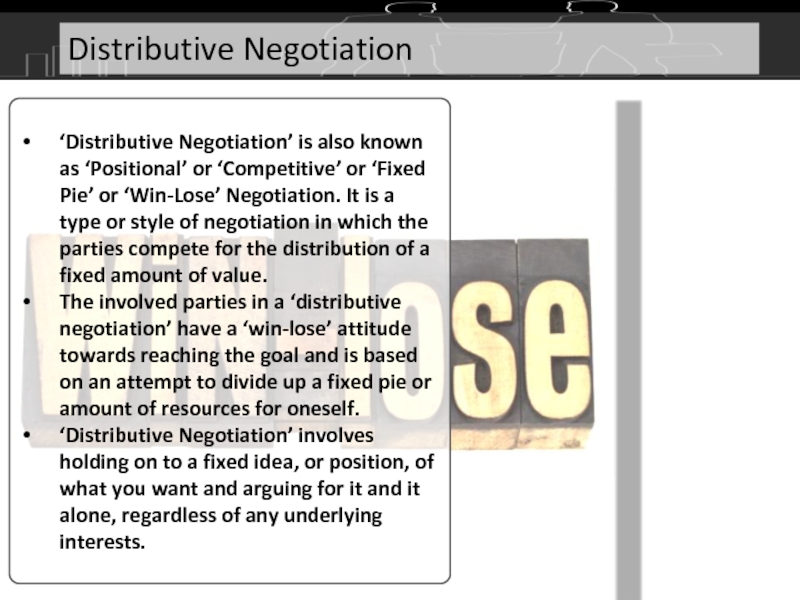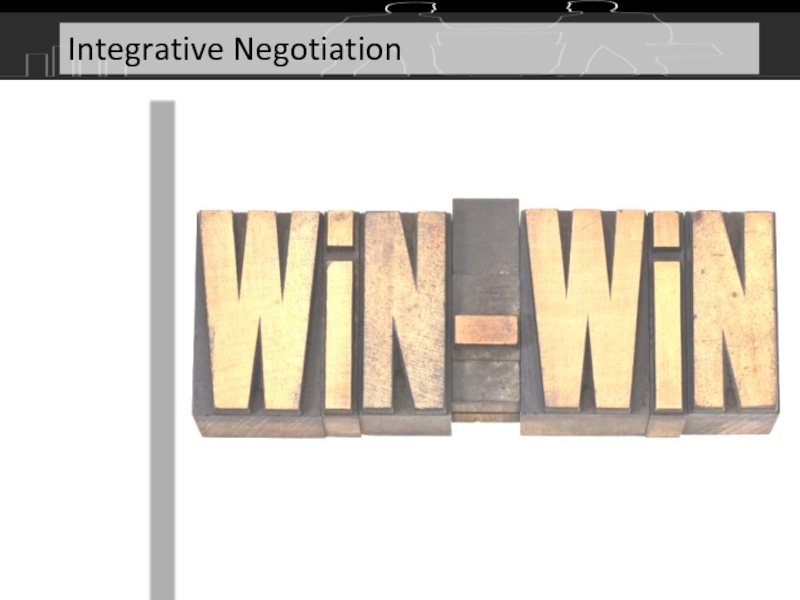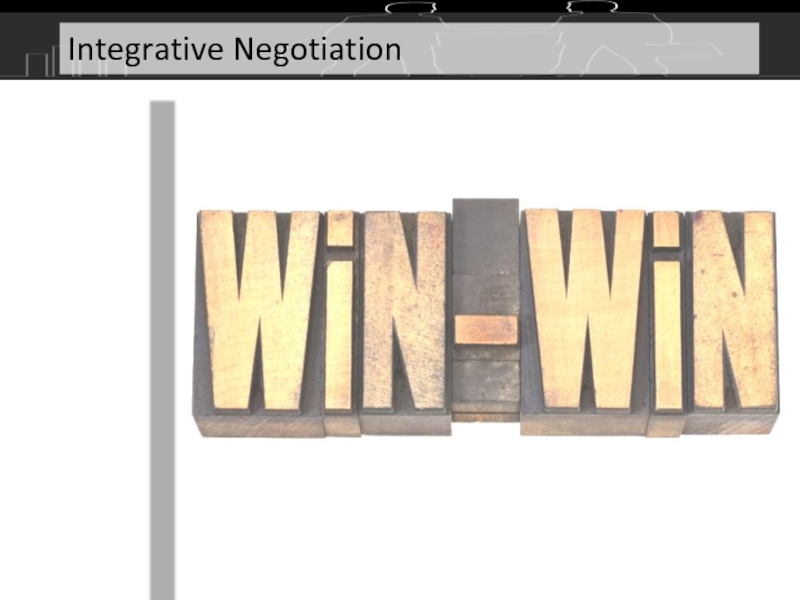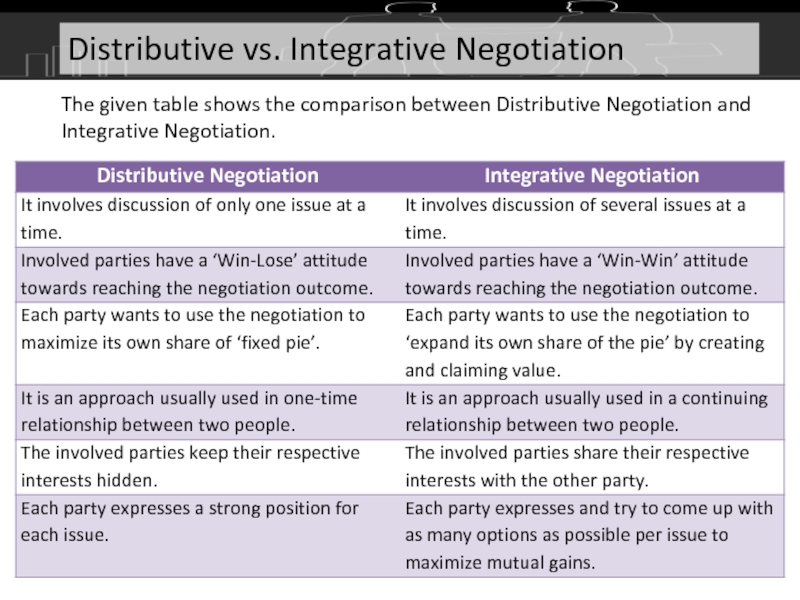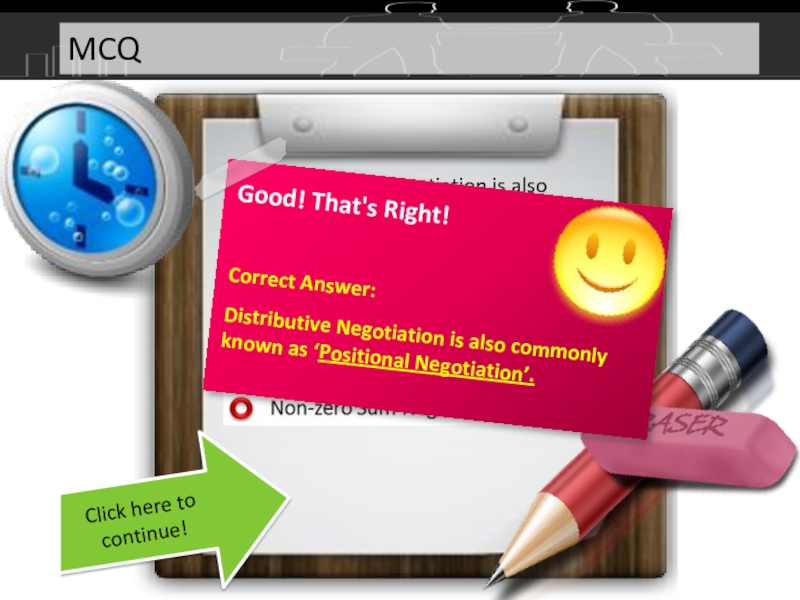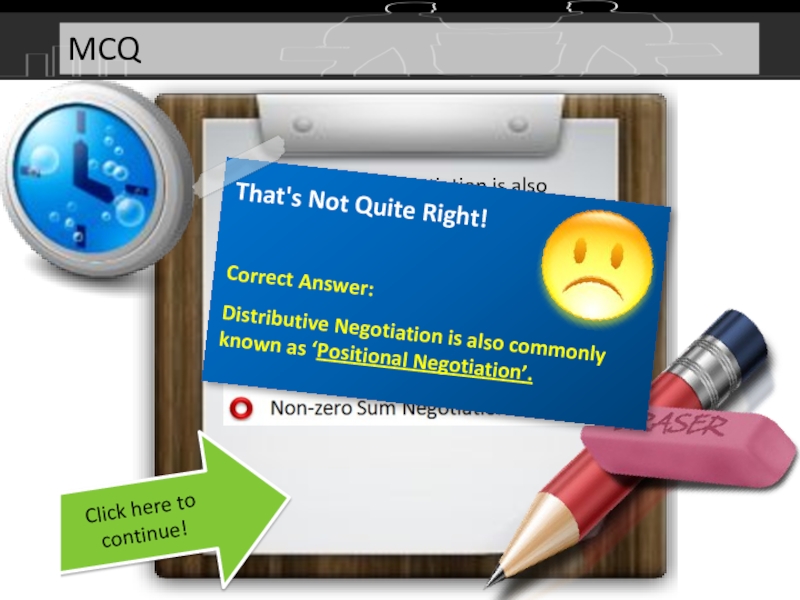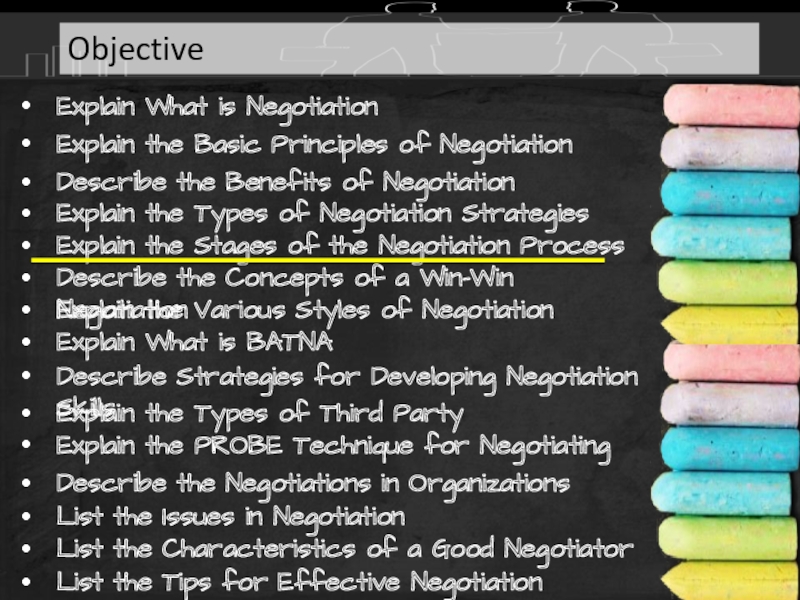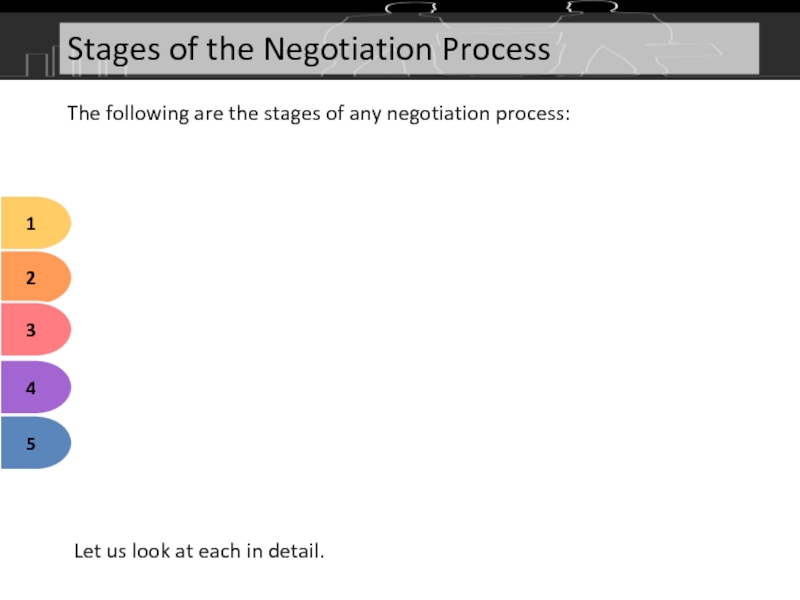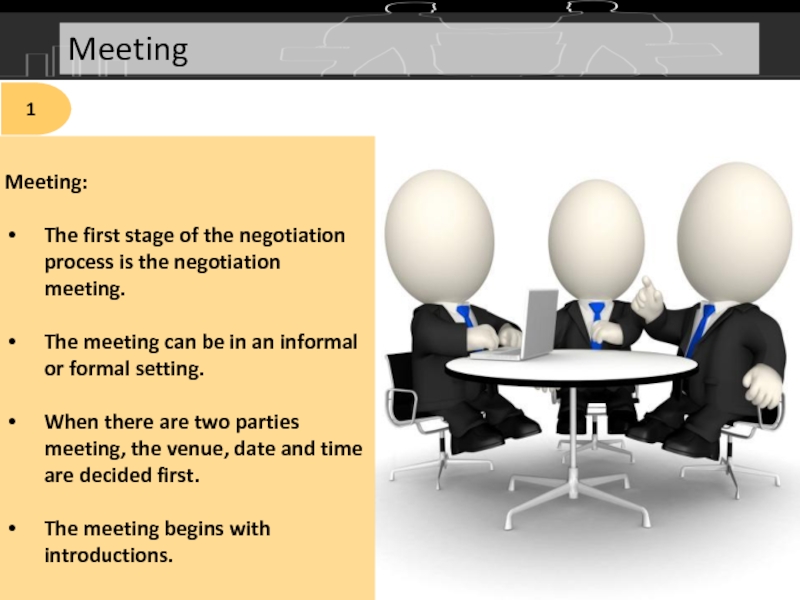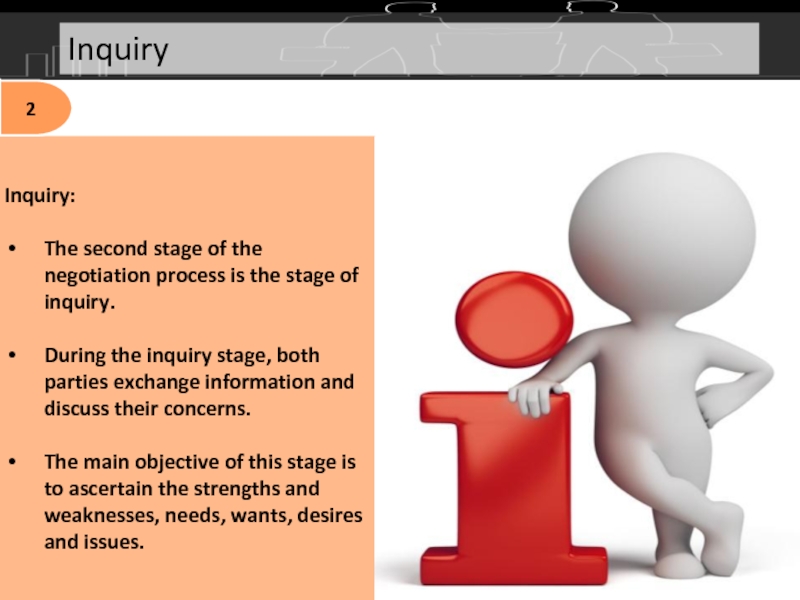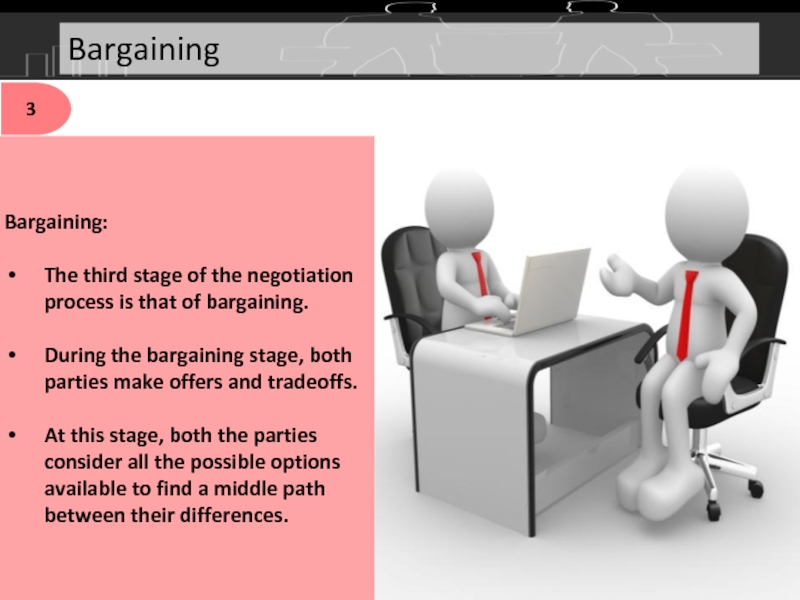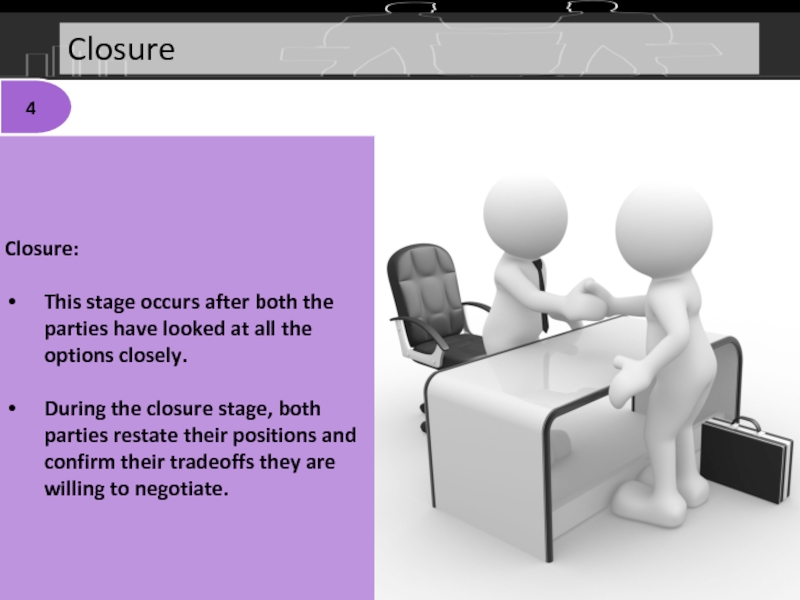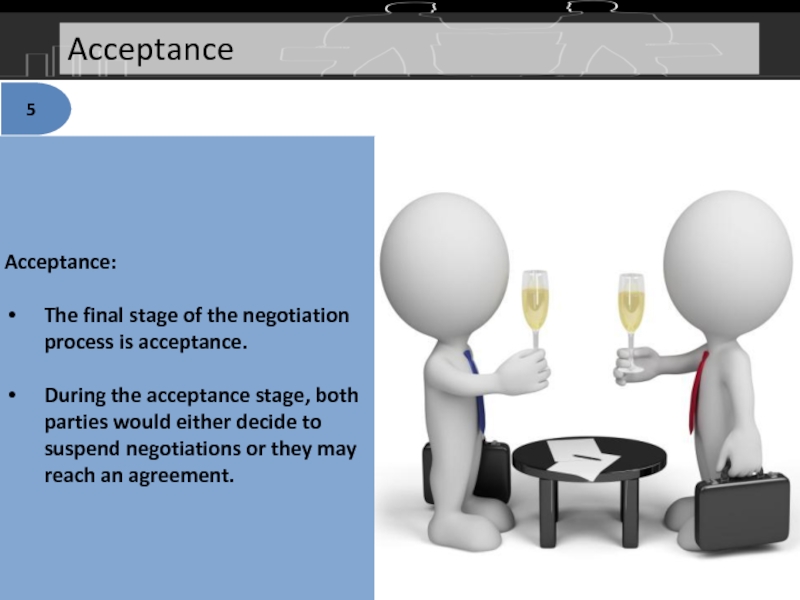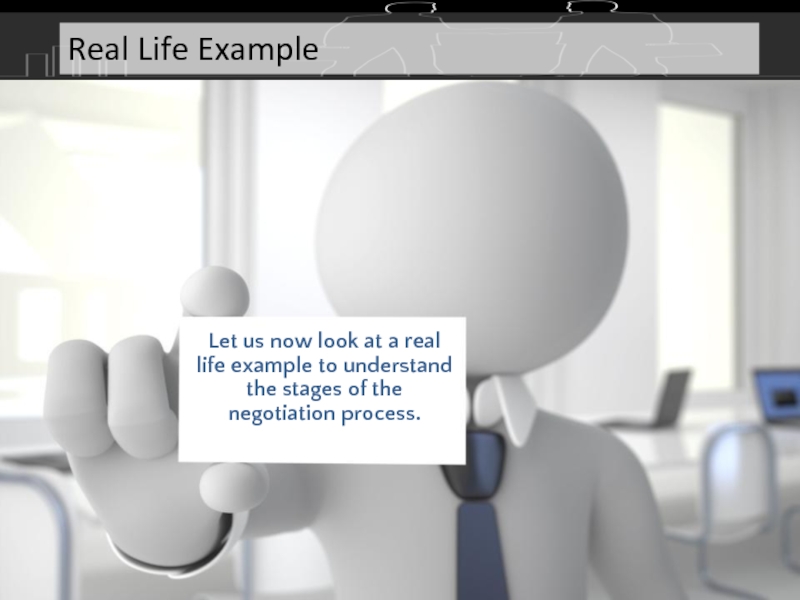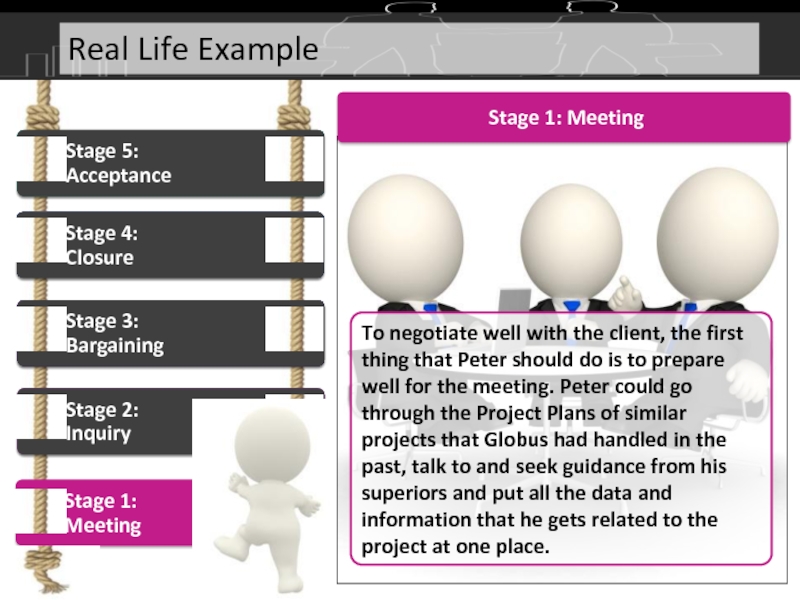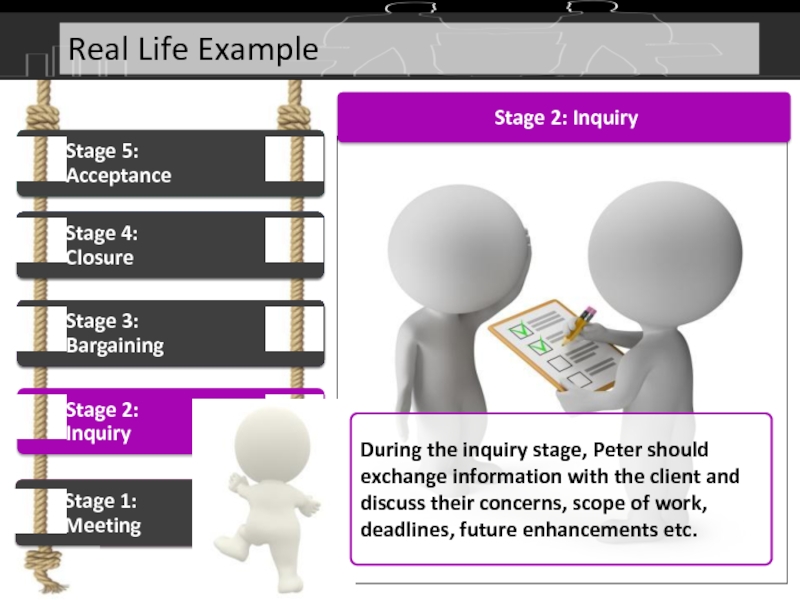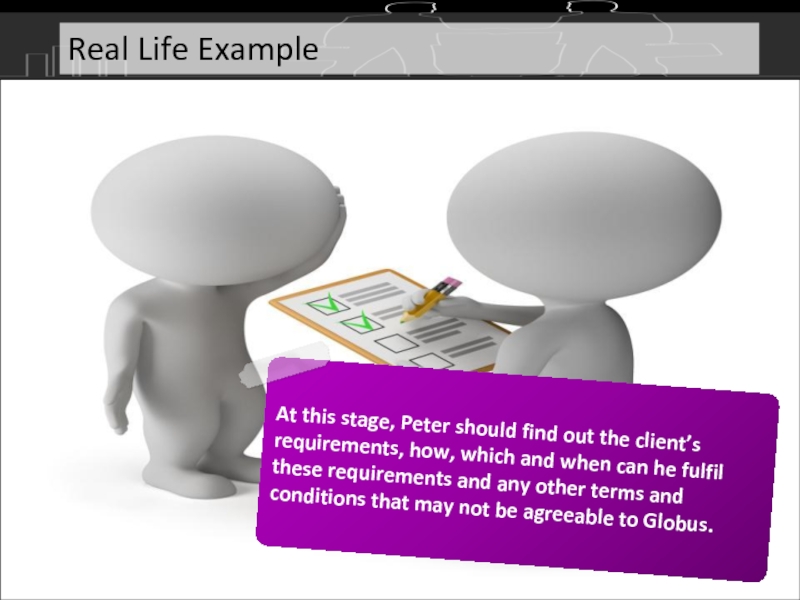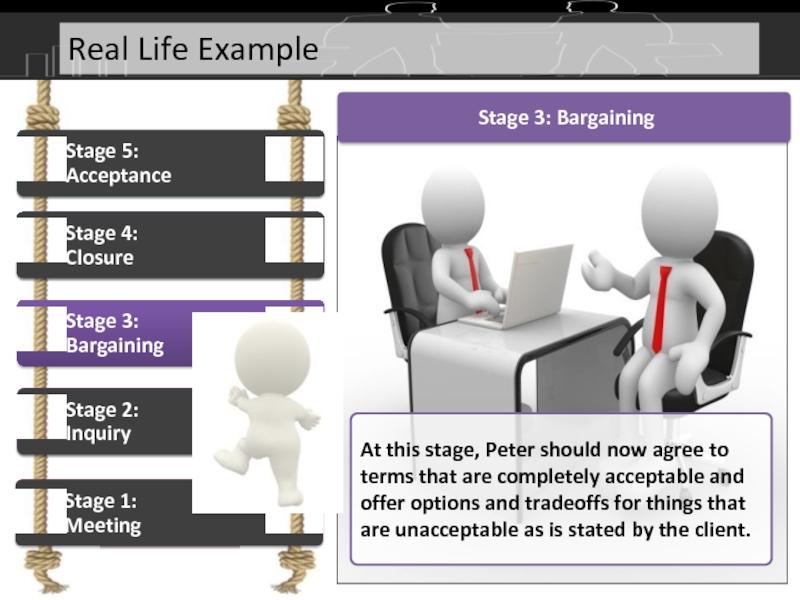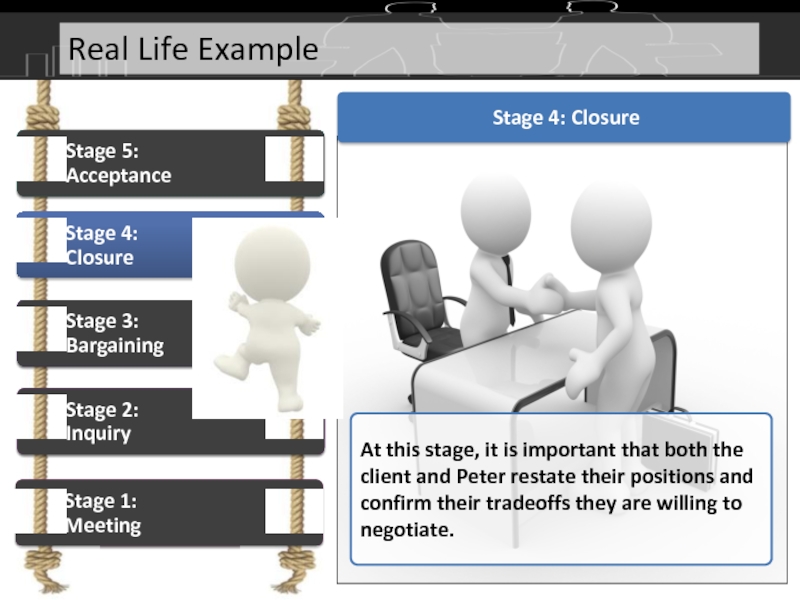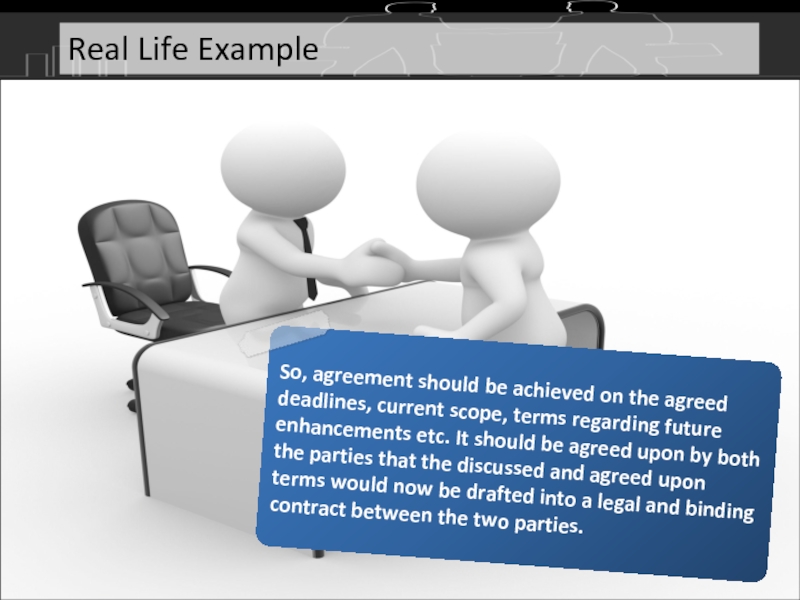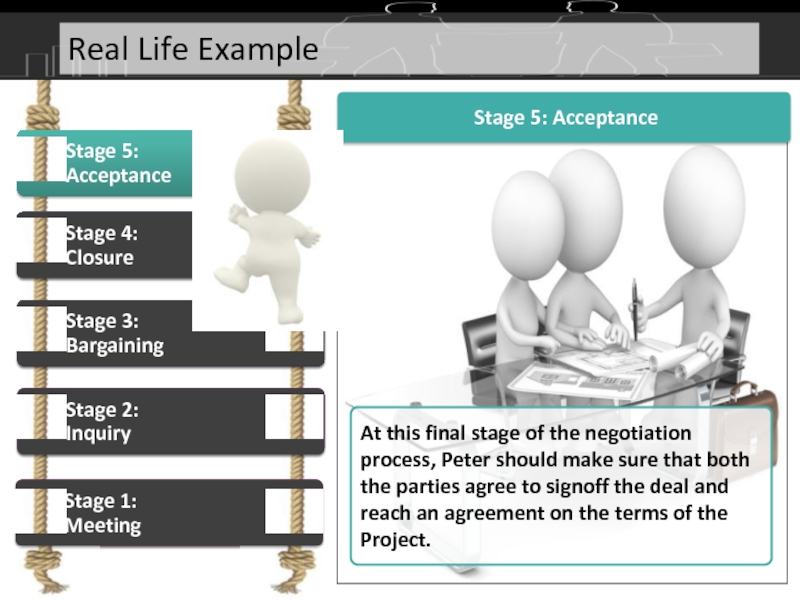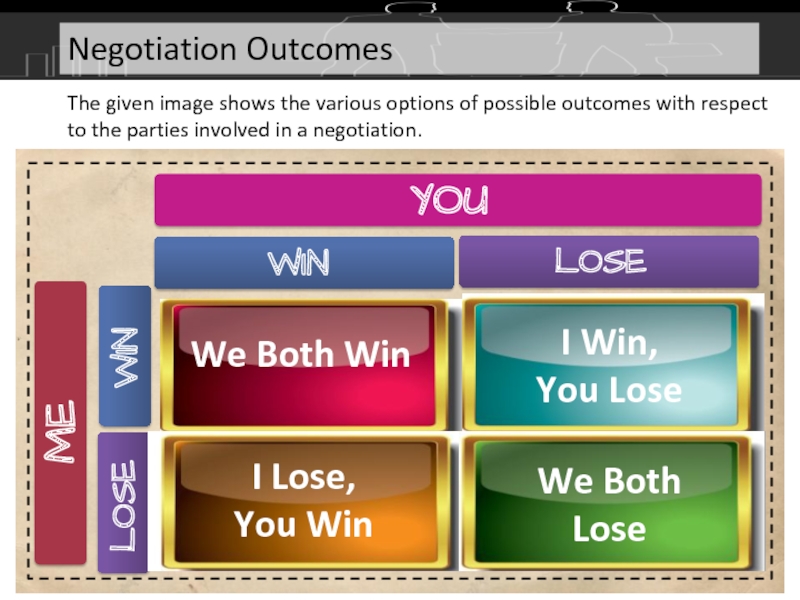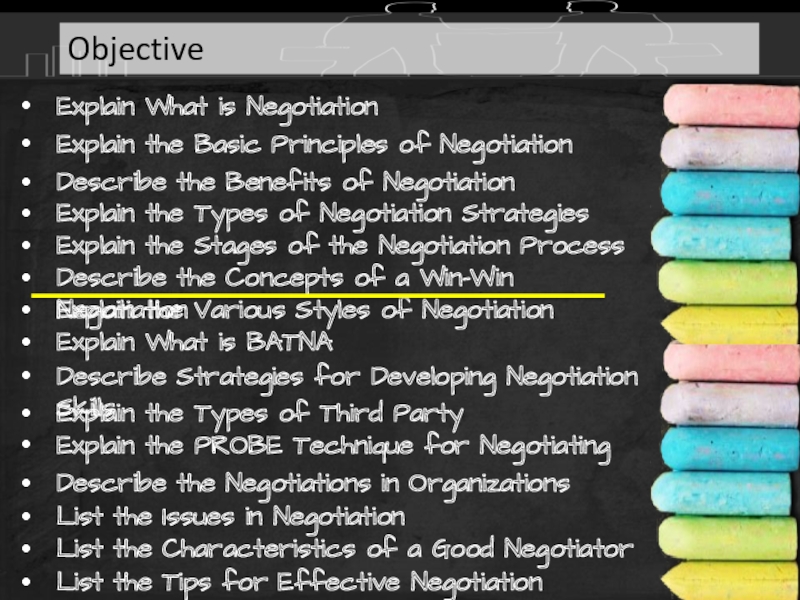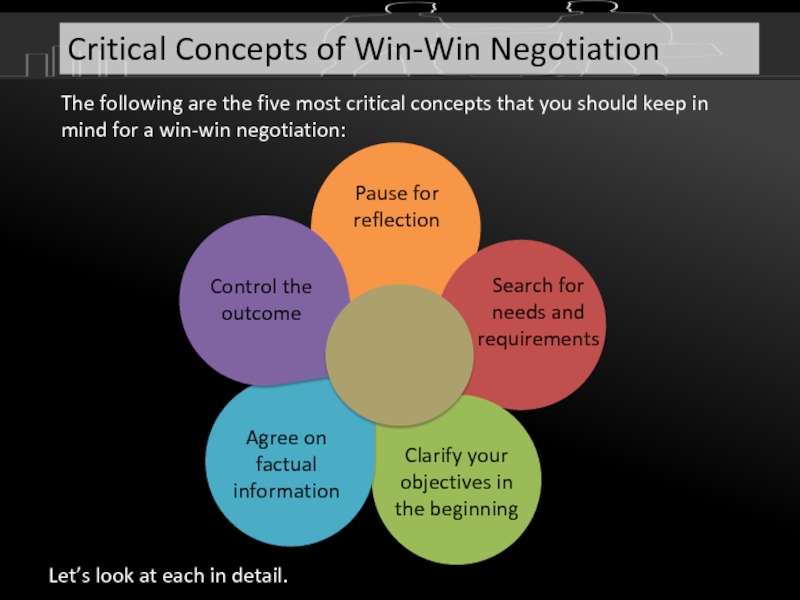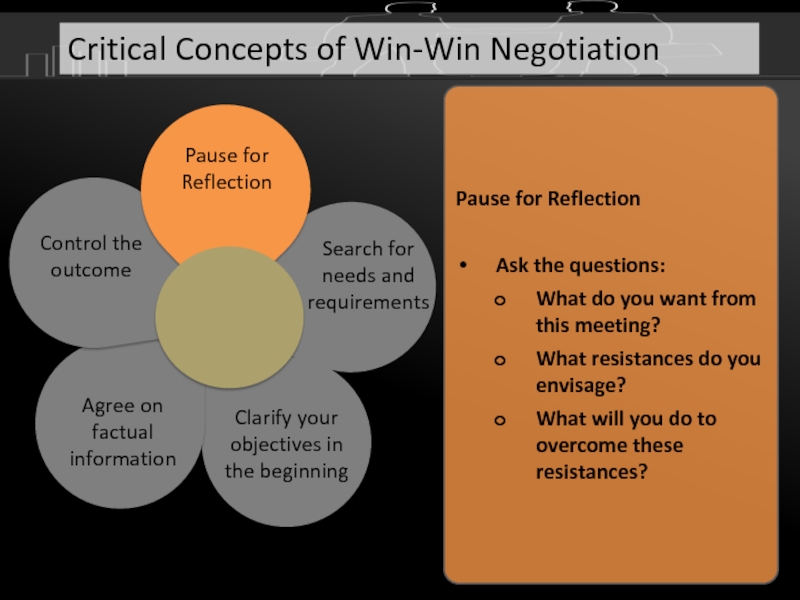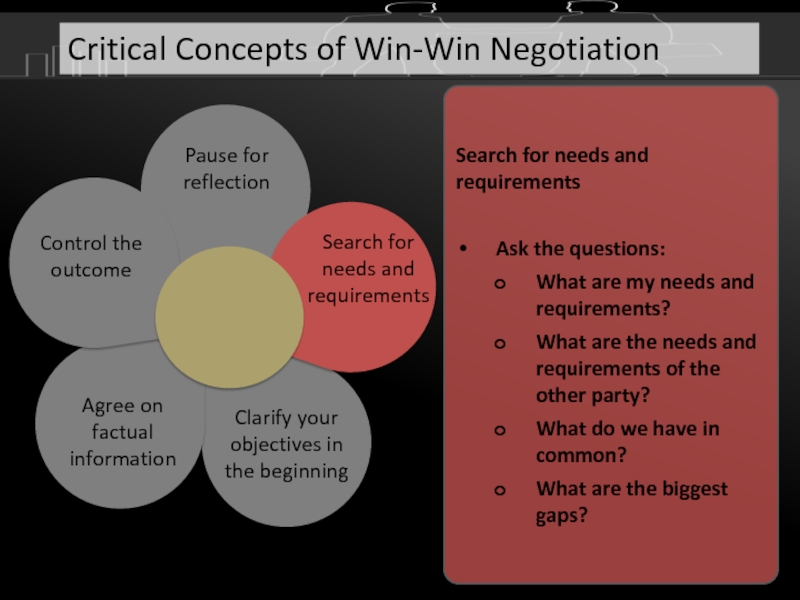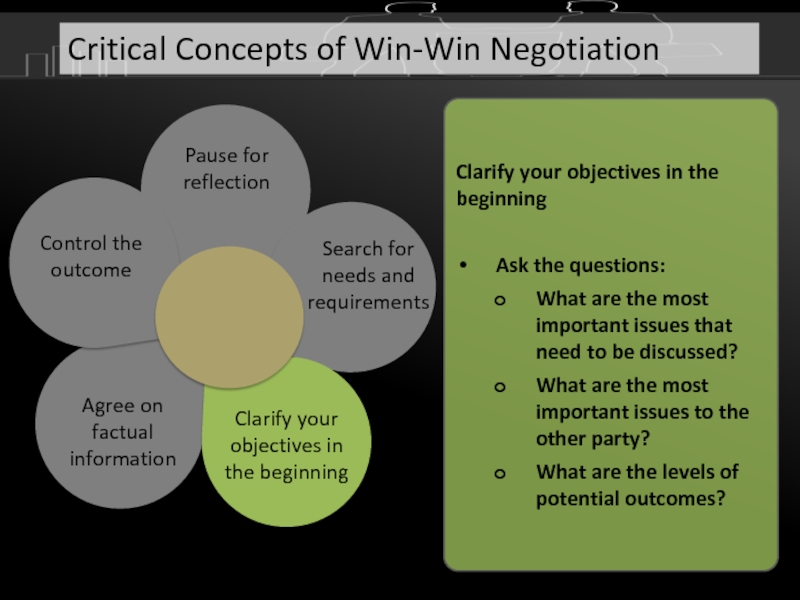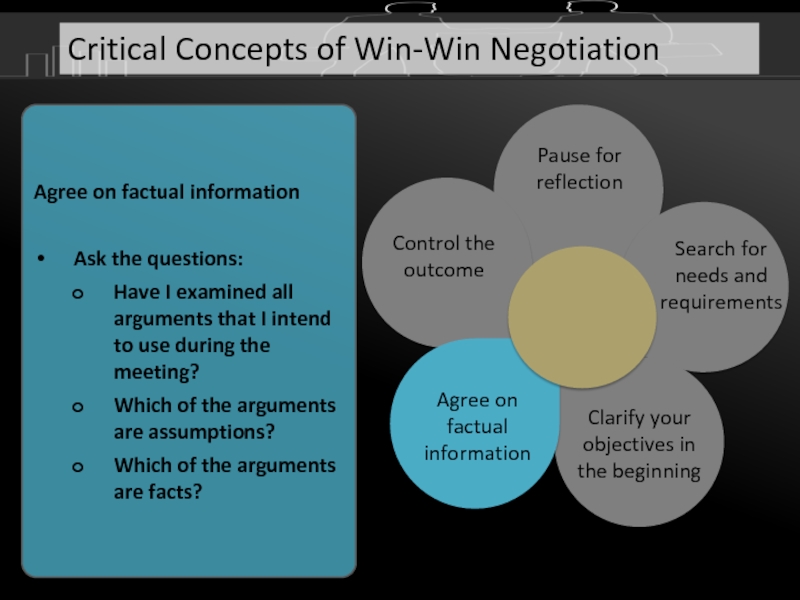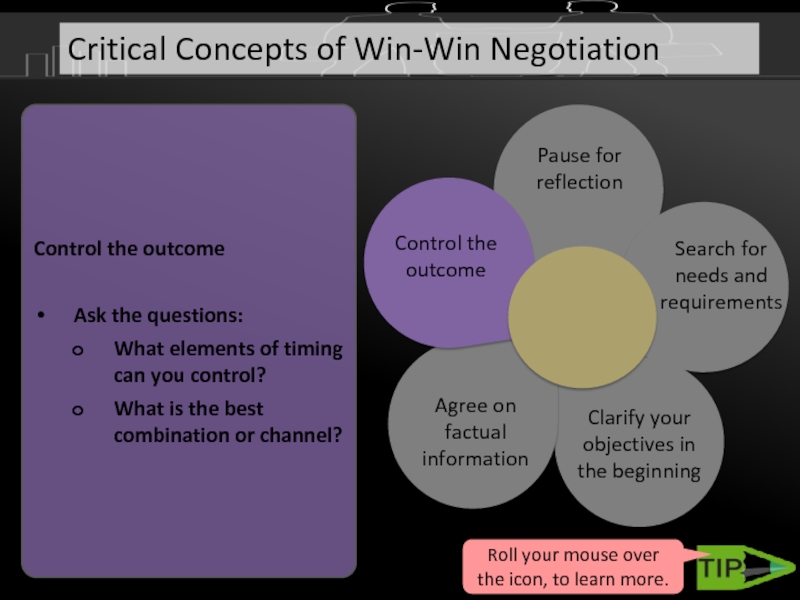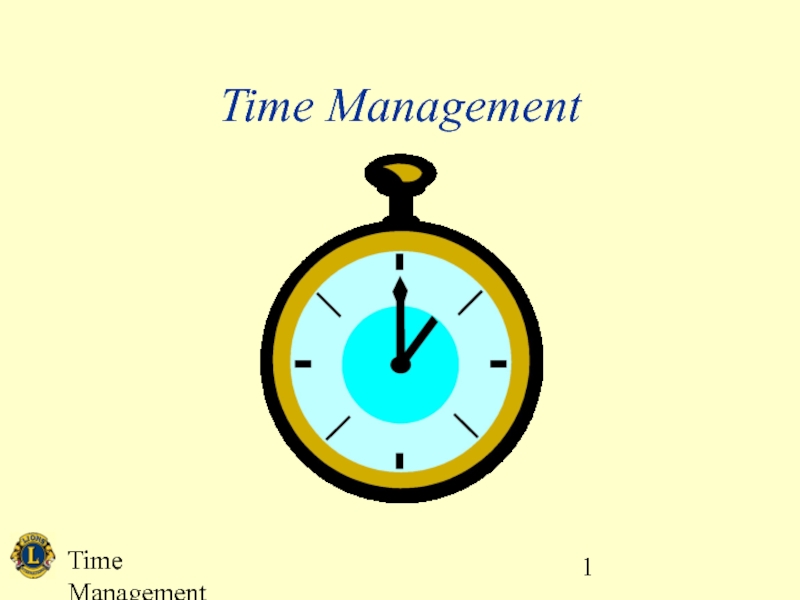- Главная
- Разное
- Дизайн
- Бизнес и предпринимательство
- Аналитика
- Образование
- Развлечения
- Красота и здоровье
- Финансы
- Государство
- Путешествия
- Спорт
- Недвижимость
- Армия
- Графика
- Культурология
- Еда и кулинария
- Лингвистика
- Английский язык
- Астрономия
- Алгебра
- Биология
- География
- Детские презентации
- Информатика
- История
- Литература
- Маркетинг
- Математика
- Медицина
- Менеджмент
- Музыка
- МХК
- Немецкий язык
- ОБЖ
- Обществознание
- Окружающий мир
- Педагогика
- Русский язык
- Технология
- Физика
- Философия
- Химия
- Шаблоны, картинки для презентаций
- Экология
- Экономика
- Юриспруденция
Negotiation skills. Basics презентация
Содержание
- 1. Negotiation skills. Basics
- 2. Explain What is Negotiation Explain the Basic
- 3. Globus Inc. is a leading IT
- 4. Maxwell Telecommunications, a leading Telecom Service
- 5. Peter carefully reviewed and analyzed Maxwell’s
- 6. Now, the only thing that Peter
- 7. Peter held a meeting with the
- 8. The client was in a hurry
- 9. When the project was under progress,
- 10. Peter and his team were not
- 11. Also, the client added new requirements
- 12. Hence, Globus had to incur a
- 13. Also, Peter’s team was forced to
- 14. Why do you think Peter’s team
- 15. Yes, all this happened because Peter
- 16. If Peter had clearly negotiated the
- 17. Also, if Peter had negotiated the
- 18. Thus, you can see that ‘negotiation
- 19. Explain What is Negotiation Explain the Basic
- 20. Negotiation is a discussion between two parties
- 21. The key skills that are involved in
- 24. Explain What is Negotiation Explain the Basic
- 25. There are a few common basic principles
- 26. There are a few common basic principles
- 27. There are a few common basic principles
- 30. Explain What is Negotiation Explain the Basic
- 31. The following are some of the benefits
- 32. The following are some of the benefits
- 33. Explain What is Negotiation Explain the Basic
- 34. There are two main types of negotiation
- 35. ‘Distributive Negotiation’ is also known as ‘Positional’
- 36. ‘Distributive Negotiation’ is also known as ‘Positional’
- 37. ‘Integrative Negotiation’ is also known as
- 38. ‘Integrative Negotiation’ is also known as
- 39. The following are the most crucial skills
- 40. The given table shows the comparison between Distributive Negotiation and Integrative Negotiation.
- 41. The given table shows the comparison between Distributive Negotiation and Integrative Negotiation.
- 42. Q. Distributive Negotiation is also commonly known
- 43. Q. Distributive Negotiation is also commonly known as ___________. Click here to continue!
- 44. Q. Distributive Negotiation is also commonly known as ___________. Click here to continue!
- 45. Explain What is Negotiation Explain the Basic
- 46. The following are the stages of any
- 47. Meeting: The first stage of the
- 48. Inquiry: The second stage of the
- 49. Bargaining: The third stage of the
- 50. Closure: This stage occurs after both
- 51. Acceptance: The final stage of the
- 52. Let us now look at a real
- 53. You have seen in the introduction
- 54. Yes, all this happened because Peter
- 55. To negotiate well with the client,
- 56. To negotiate well with the client,
- 57. During the inquiry stage, Peter should
- 58. During the inquiry stage, Peter should
- 59. At this stage, Peter should now
- 60. At this stage, Peter should now
- 61. At this stage, it is important
- 62. At this stage, it is important
- 63. At this final stage of the
- 64. The given image shows the various options
- 65. Explain What is Negotiation Explain the Basic
- 66. Let’s look at each in
- 67. Pause for Reflection Ask the
- 68. Search for needs and requirements
- 69. Clarify your objectives in the beginning
- 70. Agree on factual information Ask
- 71. Control the outcome Ask the
- 72. One of the best practices that you
- 73. ManagementStudyGuide.com
Слайд 2Explain What is Negotiation
Explain the Basic Principles of Negotiation
Describe the
Explain the Types of Negotiation Strategies
Explain the Stages of the Negotiation Process
Describe the Concepts of a Win-Win Negotiation
Explain the Various Styles of Negotiation
Explain What is BATNA
Describe Strategies for Developing Negotiation Skills
Explain the Types of Third Party
Explain the PROBE Technique for Negotiating
Describe the Negotiations in Organizations
List the Issues in Negotiation
List the Tips for Effective Negotiation
List the Characteristics of a Good Negotiator
Слайд 3
Globus Inc. is a leading IT giant. Peter Looney is a
Слайд 4
Maxwell Telecommunications, a leading Telecom Service company recently came to Globus
Слайд 5
Peter carefully reviewed and analyzed Maxwell’s requirements and came up with
Слайд 6
Now, the only thing that Peter needed to go ahead with
Слайд 7
Peter held a meeting with the clients to discuss the Project
Слайд 8
The client was in a hurry to get the software. Peter
Слайд 9
When the project was under progress, Peter and his team realized
Слайд 10
Peter and his team were not able to complete the project
Слайд 11
Also, the client added new requirements that had to be incorporated
Слайд 12
Hence, Globus had to incur a loss in the project because
Слайд 13
Also, Peter’s team was forced to work 7-days, even from home
Слайд 14
Why do you think Peter’s team had to suffer? Why did
Слайд 15
Yes, all this happened because Peter had not initially negotiated well
Слайд 16
If Peter had clearly negotiated the terms of the project with
Слайд 17
Also, if Peter had negotiated the scope of work in detail
Слайд 18
Thus, you can see that ‘negotiation skills’ are a must for
Слайд 19Explain What is Negotiation
Explain the Basic Principles of Negotiation
Describe the
Explain the Types of Negotiation Strategies
Explain the Stages of the Negotiation Process
Describe the Concepts of a Win-Win Negotiation
Explain the Various Styles of Negotiation
Explain What is BATNA
Describe Strategies for Developing Negotiation Skills
Explain the Types of Third Party
Explain the PROBE Technique for Negotiating
Describe the Negotiations in Organizations
List the Issues in Negotiation
List the Tips for Effective Negotiation
List the Characteristics of a Good Negotiator
Слайд 20Negotiation is a discussion between two parties to find out the
It involves using the art of ‘persuasion’ to get others to understand and agree with your viewpoint. It works best when an individual has a win-win attitude.
Слайд 21The key skills that are involved in a successful negotiation are
Therefore, negotiations may take place between various kinds of different people such as between a customer and seller, a boss and employee, two business partners, a diplomat or a civil servant and a foreign diplomat, between spouses, between friends and between parents and children.
Слайд 24Explain What is Negotiation
Explain the Basic Principles of Negotiation
Describe the
Explain the Types of Negotiation Strategies
Explain the Stages of the Negotiation Process
Describe the Concepts of a Win-Win Negotiation
Explain the Various Styles of Negotiation
Explain What is BATNA
Describe Strategies for Developing Negotiation Skills
Explain the Types of Third Party
Explain the PROBE Technique for Negotiating
Describe the Negotiations in Organizations
List the Issues in Negotiation
List the Tips for Effective Negotiation
List the Characteristics of a Good Negotiator
Слайд 25There are a few common basic principles that apply to all
Слайд 26There are a few common basic principles that apply to all
Слайд 27There are a few common basic principles that apply to all
Слайд 30Explain What is Negotiation
Explain the Basic Principles of Negotiation
Describe the
Explain the Types of Negotiation Strategies
Explain the Stages of the Negotiation Process
Describe the Concepts of a Win-Win Negotiation
Explain the Various Styles of Negotiation
Explain What is BATNA
Describe Strategies for Developing Negotiation Skills
Explain the Types of Third Party
Explain the PROBE Technique for Negotiating
Describe the Negotiations in Organizations
List the Issues in Negotiation
List the Tips for Effective Negotiation
List the Characteristics of a Good Negotiator
Слайд 31The following are some of the benefits of negotiations:
Good negotiations help
They help you to identify and understand you’re as well as the other parties’ interests and also understand the differences between both.
It helps to reach a ‘Win-Win’ Solution, which is mutually beneficial to all the parties involved in a negotiation.
Good negotiations also help to improve interpersonal relationships.
Слайд 32The following are some of the benefits of negotiations:
They help to
It is one of the easiest and quickest ways to solve conflicts and disagreements.
Negotiations help to reduces stress and frustration among two conflicting individuals.
Negotiations help to reach an agreement in cases where a dead-end may be reached if a consensus is not established between two differing needs, wants or opinions.
Слайд 33Explain What is Negotiation
Explain the Basic Principles of Negotiation
Describe the
Explain the Types of Negotiation Strategies
Explain the Stages of the Negotiation Process
Describe the Concepts of a Win-Win Negotiation
Explain the Various Styles of Negotiation
Explain What is BATNA
Describe Strategies for Developing Negotiation Skills
Explain the Types of Third Party
Explain the PROBE Technique for Negotiating
Describe the Negotiations in Organizations
List the Issues in Negotiation
List the Tips for Effective Negotiation
List the Characteristics of a Good Negotiator
Слайд 34There are two main types of negotiation strategies which are as
Let’s look at each in detail.
Слайд 35‘Distributive Negotiation’ is also known as ‘Positional’ or ‘Competitive’ or ‘Fixed
The involved parties in a ‘distributive negotiation’ have a ‘win-lose’ attitude towards reaching the goal and is based on an attempt to divide up a fixed pie or amount of resources for oneself.
‘Distributive Negotiation’ involves holding on to a fixed idea, or position, of what you want and arguing for it and it alone, regardless of any underlying interests.
Слайд 36‘Distributive Negotiation’ is also known as ‘Positional’ or ‘Competitive’ or ‘Fixed
The involved parties in a ‘distributive negotiation’ have a ‘win-lose’ attitude towards reaching the goal and is based on an attempt to divide up a fixed pie or amount of resources for oneself.
‘Distributive Negotiation’ involves holding on to a fixed idea, or position, of what you want and arguing for it and it alone, regardless of any underlying interests.
The main focus in such a type of negotiation strategy is on achieving immediate goals, with little or no regard for building future relationships. Generally, no new creative solution is reached in such negotiations as the parties spend least possible time and energy in resolving the conflict. The outcome of the negotiation is reached by presentation of fixed solutions and a decision or choice is made quickly.
Слайд 37
‘Integrative Negotiation’ is also known as ‘Interest-based’ or ‘Cooperative’ or ‘Win-Win’
‘Integrative Negotiation’ involves reaching an agreement keeping into consideration both the parties’ interests which includes the needs, desires, concerns, and fears important to each side.
Слайд 38
‘Integrative Negotiation’ is also known as ‘Interest-based’ or ‘Cooperative’ or ‘Win-Win’
‘Integrative Negotiation’ involves reaching an agreement keeping into consideration both the parties’ interests which includes the needs, desires, concerns, and fears important to each side.
The main focus in such a type of negotiation strategy is on developing mutually beneficial agreements based on the interests of the disputants.
Generally, new creative solutions are reached in such negotiations as the parties spend maximum possible time and energy in resolving the conflict. The outcome of the negotiation is reached by collaboration between the parties to find a “win-win" solution to their dispute.
Roll your mouse over the icon, to learn more.
Слайд 39The following are the most crucial skills that can help you
• Be open and flexible
• Always be ethical
• Always empathize
• Develop good social skills
• Follow your intuitions
• Be assertive
Слайд 40The given table shows the comparison between Distributive Negotiation and Integrative
Слайд 41The given table shows the comparison between Distributive Negotiation and Integrative
Слайд 42Q. Distributive Negotiation is also commonly known as ___________.
Click on the
Слайд 45Explain What is Negotiation
Explain the Basic Principles of Negotiation
Describe the
Explain the Types of Negotiation Strategies
Explain the Stages of the Negotiation Process
Describe the Concepts of a Win-Win Negotiation
Explain the Various Styles of Negotiation
Explain What is BATNA
Describe Strategies for Developing Negotiation Skills
Explain the Types of Third Party
Explain the PROBE Technique for Negotiating
Describe the Negotiations in Organizations
List the Issues in Negotiation
List the Tips for Effective Negotiation
List the Characteristics of a Good Negotiator
Слайд 47Meeting:
The first stage of the negotiation process is the negotiation meeting.
The meeting can be in an informal or formal setting.
When there are two parties meeting, the venue, date and time are decided first.
The meeting begins with introductions.
Слайд 48Inquiry:
The second stage of the negotiation process is the stage of
During the inquiry stage, both parties exchange information and discuss their concerns.
The main objective of this stage is to ascertain the strengths and weaknesses, needs, wants, desires and issues.
Слайд 49Bargaining:
The third stage of the negotiation process is that of bargaining.
During the bargaining stage, both parties make offers and tradeoffs.
At this stage, both the parties consider all the possible options available to find a middle path between their differences.
Слайд 50Closure:
This stage occurs after both the parties have looked at all
During the closure stage, both parties restate their positions and confirm their tradeoffs they are willing to negotiate.
Слайд 51Acceptance:
The final stage of the negotiation process is acceptance.
During the
Слайд 53
You have seen in the introduction scenario how Peter Looney, a
Слайд 54
Yes, all this happened because Peter had not initially negotiated well
Слайд 55
To negotiate well with the client, the first thing that Peter
Слайд 56
To negotiate well with the client, the first thing that Peter
Peter should also make a list of all the queries that he has to clear with the client, things that he can agree to and cannot agree to with the client etc.
Also, at the meeting Peter should come across to the client as a cool, confident and professional person.
Слайд 57
During the inquiry stage, Peter should exchange information with the client
Слайд 58
During the inquiry stage, Peter should exchange information with the client
At this stage, Peter should find out the client’s requirements, how, which and when can he fulfil these requirements and any other terms and conditions that may not be agreeable to Globus.
Слайд 59
At this stage, Peter should now agree to terms that are
Слайд 60
At this stage, Peter should now agree to terms that are
Peter should make sure that he ascertains his position and takes a stand in agreeing to only possible and acceptable deadlines, current scope, terms regarding future enhancements etc.
Слайд 61
At this stage, it is important that both the client and
Слайд 62
At this stage, it is important that both the client and
So, agreement should be achieved on the agreed deadlines, current scope, terms regarding future enhancements etc. It should be agreed upon by both the parties that the discussed and agreed upon terms would now be drafted into a legal and binding contract between the two parties.
Слайд 63
At this final stage of the negotiation process, Peter should make
Слайд 64The given image shows the various options of possible outcomes with
Слайд 65Explain What is Negotiation
Explain the Basic Principles of Negotiation
Describe the
Explain the Types of Negotiation Strategies
Explain the Stages of the Negotiation Process
Describe the Concepts of a Win-Win Negotiation
Explain the Various Styles of Negotiation
Explain What is BATNA
Describe Strategies for Developing Negotiation Skills
Explain the Types of Third Party
Explain the PROBE Technique for Negotiating
Describe the Negotiations in Organizations
List the Issues in Negotiation
List the Tips for Effective Negotiation
List the Characteristics of a Good Negotiator
Слайд 66
Let’s look at each in detail.
The following are the five most
Слайд 67
Pause for Reflection
Ask the questions:
What do you want from this meeting?
What
What will you do to overcome these resistances?
Слайд 68
Search for needs and requirements
Ask the questions:
What are my needs and
What are the needs and requirements of the other party?
What do we have in common?
What are the biggest gaps?
Слайд 69
Clarify your objectives in the beginning
Ask the questions:
What are the most
What are the most important issues to the other party?
What are the levels of potential outcomes?
Слайд 70
Agree on factual information
Ask the questions:
Have I examined all arguments that
Which of the arguments are assumptions?
Which of the arguments are facts?
Слайд 71
Control the outcome
Ask the questions:
What elements of timing can you control?
What
Roll your mouse over the icon, to learn more.
